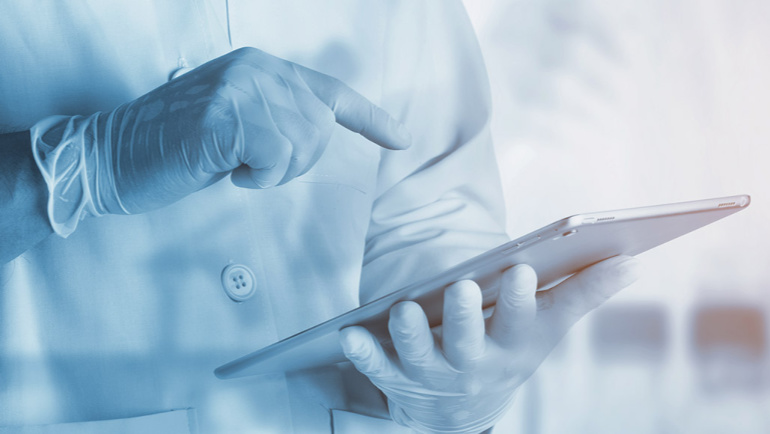
With the COVID-19 pandemic putting life as we knew it on hold, many Wayne State researchers are aggressively shifting their focus to addressing the virus. To date, researchers have proposed more than 60 research projects to detect, prevent, treat and recover from COVID-19.
Several of those proposals have already been submitted to federal agencies and other funding organizations for consideration.
“I am impressed, but not surprised by the passion and speed with which our faculty has responded to this new and challenging virus,” said Steve Lanier, vice president for Research. “This response includes not only efforts focused on the development of new therapies and vaccines, but also a broad range of studies in the areas of behavioral and social sciences that cut across multiple schools, colleges and centers on campus. Another area of primary focus of our research and outreach efforts on COVID-19 is related to issues of health equity and the disproportionate impact that the virus has in various communities that we serve here in Detroit.”
A few of the projects proposed by Wayne State researchers include:
- With the rapid expansion of COVID-19, there is an urgent need for people to know their infection risk when traveling. Weisong Shi, associate dean for research in the College of Engineering and professor of Computer Science, and Ming Dong, professor of Computer Science, propose the creation of an edge intelligence system, including a mobile app, that would collect data to help determine infection risk in an area. This system has the potential to aid in decision-making regarding whether it is safe to hold major events and could also help governments perceive the risk of infection in their jurisdictions, and thus guide infection prevention and control.
- Gil Mor, scientific director of the C.S. Mott Center for Human Growth and Development and vice chair of research in the Department of Obstetrics and Gynecology, proposes development of an anti-viral therapy to prevent COVID-19 infection during pregnancy. The proposed therapeutic approach is based on the identification of a natural component of the cellular anti-viral response that can stop viral expansion and/or prevent infection during pregnancy. The study’s outcome will enhance the understanding of the complexity of immune regulation at the maternal/fetal interface, but also will provide novel opportunities for the identification of predictive markers and new therapeutic approaches.
- Current reports suggest that pulmonary fibrosis may become a serious complication of COVID-19, therefore the timely development of targeted therapies for prevention and early treatment of pulmonary fibrosis in recovering COVID-19 patients is important. J.P. Jin, chair of the Department of Physiology, proposes a test of the effectiveness of reducing calponin 2, a cytoskeleton regulatory protein in multiple cell types, on mitigating pulmonary fibrosis in order to develop a targeted treatment for a large number of recovering COVID-19 patients. This exploratory research project will lay the groundwork for the development of therapeutic treatment and prevention of pulmonary fibrosis in COVID-19.
- Phillip Levy, the Edward S. Thomas Endowed Professor and associate chair of research, Department of Emergency Medicine, and assistant vice president for translational science and clinical research innovation, hopes to assess the post-recovery effects of COVID-19 infection and stress on cardiovascular health among first responders and frontline health care workers. The proposed study will aim to address what the impact of COVID-19 infection on heart health will be eight to 10 months after recovery, and the relationship between COVID-19 and heart health moderated by perceived stress or stress-related mental health disorders (e.g., major depressive disorder or post-traumatic stress disorder).
- Mark Favot, associate professor of Emergency Medicine, will evaluate the cardiovascular impact of COVID-19 as seen on serial point of care echocardiograms utilizing a combination of conventional 2D echocardiography techniques, as well as speckle tracking echocardiography. The proposed study will take place in the emergency departments of Sinai-Grace Hospital and Detroit Receiving Hospital.
Responding to an infectious disease crisis requires the integration of basic research to understand the contagion and the disease process with the development and testing of vaccines and therapies. As research teams from academic, industry and clinical institutions respond to the COVID-19 crisis, coordination of efforts will maximize efficiency and be of broad benefit for all of those in the communities that we serve. The Office of the Vice President for Research has established two mechanisms as a platform to connect, support and coordinate across this sector.
The first mechanism involves information sharing for ongoing COVID-19 active and planned basic and clinical research initiatives on campus. A request for this information was sent out to all Wayne State faculty. This collected information will be available in a COVID-19 research index to help coordinate these research activities across campus.
The second mechanism involves coordination of clinical research activities that involve clinical trials, specimen collections, behavioral studies data tabulation/assessment and other studies involving human subjects or health care information. The Vice President for Research has established an advisory committee to coordinate, integrate and enable clinical research initiatives related to COVID-19.
The committee will provide rapid-turnaround initial screens of proposed studies prior to IRB review to align studies as needed to maximize access to resources and enhance feasibility and merit. The committee will consider community impact and compliance with evolving state and federal guidelines for assuring adequate protections to the community. When required, the committee has access to subject matter experts with a wide range of expertise.
